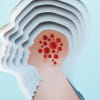Exploring the causes and symptoms of dementia

Dementia is a cruel debilitating disease that affects the lives of millions of people across the globe. It is a terrifying condition that slowly erases people's memories, their ability to think and reason, and their ability to do daily menial tasks eventually losing their independence. Although it is easy to dismiss the early signs of dementia as "getting old", it is crucial to identify these symptoms and provide necessary care and support and get early treatment if necessary.
Dementia can be caused by a single or a combination of diseases such as Alzheimer's, Parkinson's, and Huntington's. Alzheimer's is overall the most common disease that causes it, about 70 per cent according to scientists. In a nutshell, dementia is caused by the death of brain cells and the failure of rational function. This makes it harder to spot which disease specifically causes dementia-like symptoms and this can be attributed to several factors.
Age is the leading cause, as naturally when the body ages, the birth and repair of new cells slow down further increasing the odds of dementia. It is also entirely possible to inherit Alzheimer's or Huntington's from either parent which can cause dementia to appear earlier and more severe than expected.
There are several other risk elements including high blood pressure, high cholesterol levels, diabetes, and obesity. Poor diet and smoking also put people at high risk of dementia. Smoking in particular escalates the chance of dementia by 50 per cent in some cases.
Memory loss, difficulty speaking or communicating, a sudden behaviour change, and difficulties with daily tasks can all be warning symptoms of the disease. The symptoms typically begin mildly and gradually worsen over time. It is crucial to remember that none of these symptoms alone can prove that someone has dementia, but if they continue for a while, it is worthwhile to see your doctor for a check-up.
Unfortunately, dementia is one of the diseases which have no cure in the present world. However, some treatments and interventions can manage the mental and physical symptoms. Medications combined with speech therapy and other relevant therapy sessions go a long way to prolonging degeneration.

 For all latest news, follow The Daily Star's Google News channel.
For all latest news, follow The Daily Star's Google News channel. 








Comments